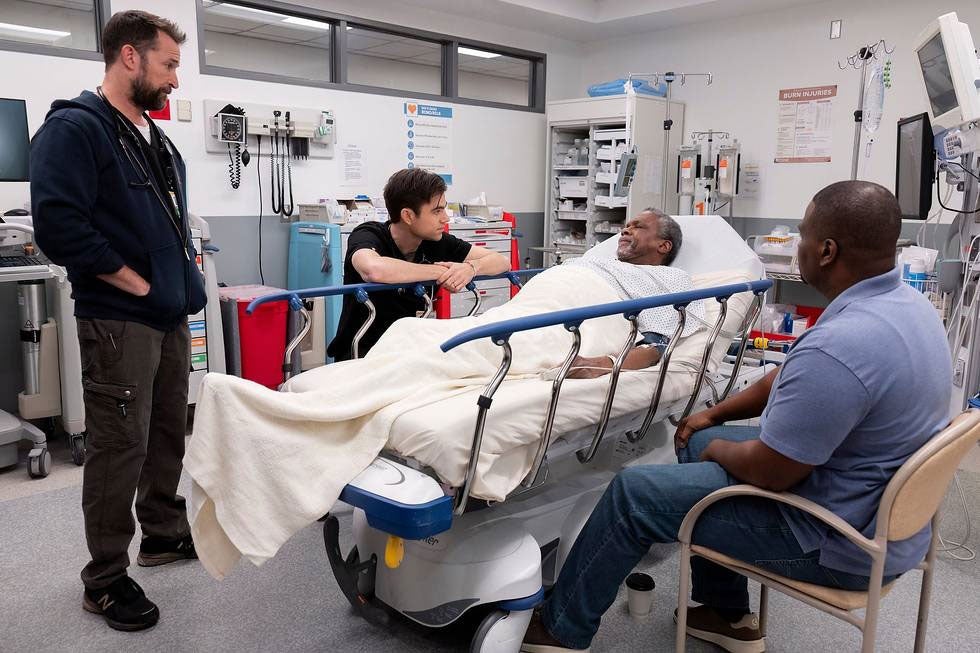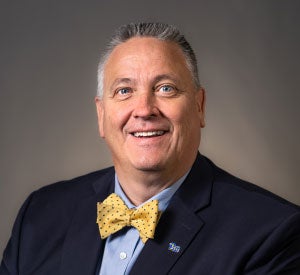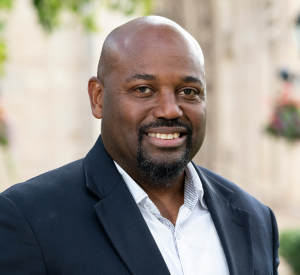HBO Max’s “The Pitt” medical drama follows a team of health professionals at the fictional Pittsburgh Trauma Medical Center emergency department, known as “The Pitt.” Starring Noah Wyle, who also serves as executive producer and co-writer, the show chronicles a 15-hour shift with each episode being one real-time hour. The scripts, set design, real-life cases and even absence of background music are purposely designed to give the audience a brutally honest look at the stress-filled and fast-paced environment of an emergency department in the city of Pittsburgh.
“The Pitt” premiered on January 9, 2025, and gained a massive following among medical professionals and TV fans alike, earning 13 Emmy nominations, including Best Drama Series as well as Best Actor in a Drama Series for Wyle. While its first season ended in April, it continues to have relevance months after its end, especially with its second season already in production.
In its eighth episode, “2:00 P.M.,” the show includes a storyline about the Freedom House Ambulance Service. While many viewers did not know its name, it played a crucial role in the development of the field of emergency medicine and the inclusion of this plotline reflects the attention to detail and accuracy of the show’s scripts.
Several of the medical advisors to the show were from Pittsburgh, one being Dr. Sylvia Owusu-Ansah, associate vice chair of diversity, equity and inclusion, Department of Pediatrics, and assistant professor of pediatrics and of emergency medicine at the University of Pittsburgh’s School of Medicine. While sitting at the writers’ table side-by-side with Wyle and series creator R. Scott Gemmill, she brought this forgotten history to light. They asked her about disparities in health care and Pittsburgh’s history of health care. Many subjects were discussed around the table and several from Dr. Owusu-Ansah’s wealth of experience made it into the show, including the Freedom House Ambulance Service.
In “2:00 P.M.,” the team treats 81-year-old Willie Alexander, an African American man with dementia. As they treat Willie for twiddler’s syndrome, a rare condition in which a patient fiddles with their pacemaker causing it to malfunction, he surprises them with his extensive medical knowledge. When asked if he is a doctor, he continually replies that he “just delivered the mail.” Near the end of the episode, his son comes to visit and explains that his dad worked for Freedom House, a paramedic service in the Hill District of Pittsburgh which pioneered and shaped paramedicine for years to come.

The Freedom House Ambulance Service
In the 1960s, paramedicine was essentially nonexistent in the U.S. Policemen were first responders and had to rush people to the hospital with little to no training in emergency medicine. According to the 2023 WQED documentary, “Freedom House Ambulance: The FIRST Responders,” the population of the Hill District, which was mostly African American, faced particular challenges in getting to hospitals. “Racial tensions were high,” reads a caption in the documentary. “Police often refused to respond to emergency calls.” However, all this changed with Freedom House Ambulance Service.
Freedom House Ambulance Service was established in 1967 by Freedom House, a Pittsburgh civil rights organization that offered training and assistance to unemployed Black men and women. This service was created for the people of the Hill District who were not receiving the care that was needed, and because of this, we now have the emergency services that we know of today across the U.S.
Dr. Peter Safar, known as the “father of CPR” and the founding chair of Pitt’s Department of Anesthesiology and Critical Care Medicine, worked with Freedom House to create and implement a 32-week training program, giving the recruits 300 hours of classroom and clinical experience. Combined with the nation’s first ambulance designs, Freedom House Ambulance Service was capable of delivering quality emergency care to people on the street.


On “The Pitt,” the character Willie says after his operation, “Freedom House took us in and trained us for 300 hours.” Each recruit was required to go through this intense training designed by Safar, which prepared the Freedom House to revolutionize paramedicine in Pittsburgh and throughout the nation.
Freedom House would go on to be very effective, saving hundreds of lives in their community. The paramedics were people who made a real difference. They were people you could trust, offering unheard-of medical services from the back of an ambulance with a response time of less than ten minutes. This was revolutionary, being the first emergency medical service to be staffed by paramedics with training beyond basic first aid.
“We started I.V.s, defibrillated, intubated in the field,” the character Willie explains to Dr. Robby and the other medical staff who intently listen to his story. “They were the heroes of the Hill District,” his son proudly adds.
However, this successful endeavor would not last. Despite the groundbreaking progress made by the Freedom House Ambulance Service, it was disbanded in 1975 when the city of Pittsburgh replaced most of the original Black Freedom House paramedics with white paramedics for their new city-wide ambulance service. This was after years of pioneering modern paramedicine. But the legacy of Freedom House lives on through the education they have continued to provide to a new generation of paramedics, including those trained at the University of Pittsburgh.
The Legacy of the Freedom House at Pitt
At the School of Health and Rehabilitation Sciences winter graduation in 2024, John Moon, one of the Freedom House paramedics, received an honorary Doctor of Science for his contributions to emergency medicine.

Thomas Platt, chair for the Department of Community Health Services and Rehabilitation Science and professor of the Emergency Medicine program, nominated Moon for the honorary degree. In his speech at the ceremony, Platt said, “John Moon was instrumental in changing the way in which Pittsburgh EMS recruited and hired EMS providers. He was responsible for creating the first minority recruitment program for the department. One of his early hires and mentees, Sheldon Williams, is a faculty member of our school’s Emergency Medicine program. To this day, John Moon still promotes the legacy of the pioneers from Freedom House by travelling and sharing the history of Freedom House with others.”
Supporters of the Freedom House at the University of Pittsburgh are seeking to reignite the story of these pioneering Black paramedics. Platt, who was never taught about the Freedom House as a new paramedic and consequently did not have the material in his own teaching curriculum, has made it his mission to ensure that the legacy of the Freedom House is known today.
Platt explained, “I’m a career paramedic turned educator, and now an administrator who understands that we have an obligation to tell these stories. We stand on the shoulders of giants who have gone unrecognized for their significant contributions and I have the platform to make sure that we make those changes. It is important for me to use my position to make sure that people understand that there have been some injustices and they need to be corrected.”
He continues, “Now, it’s time for us to correct these problems and ensure that the story continues to be told. It’s about intentionally telling this story so that people understand the history and that the history was, to use John Moon’s words, ‘a bunch of unemployables’ that got this industry started. Today, I am a paramedic because of them.”

In fact, the Emergency Medicine program at Pitt is connected to Freedom House not just through their legacy as the first paramedics, but through classroom teaching with John Moon. “The class that we’ve had him as a guest speaker in most recently was our Structural Drivers of Health course,” explains Platt, “and we just did a presentation on Freedom House for the students.”
Dr. Owusu-Ansah and U.S. Representative Summer Lee are also advocating for the Congressional Gold Medal to be awarded to the Freedom House paramedics for their contributions to American emergency medical care, a process Dr. Owusu-Ansah began in 2023.
“We meet monthly,” Dr. Owusu-Ansah says, “and I’ll be in Washington, D.C., next week to meet with one of our lobbyists who is working within Congress to have the drafted bill co-sponsored and introduced to the floor so it can be voted on and we can give the men and women of the Freedom House the recognition they deserve.”

The legacy of the Freedom House Ambulance Service cannot be understated—they changed the nation. Many more lives were and continue to be saved because of them. The University of Pittsburgh is engaged in continuing their story in its classes and community events because its Emergency Medicine program and ones around the country were built on the backs of these brave pioneers. Their legacy continues to be honored, and the dedicated writers and consultants like Dr. Owusu-Ansah did their part in sharing a piece of Pittsburgh’s emergency medicine history and shining a light on the heroes who started it all.
Additional Resources
Books and Articles
- “American Sirens” – Kevin Hazzard, 2024.
- “Dr. Peter Safar (a Retrospective): The Forgotten Heroes of Freedom House” – Department of Anesthesiology and Perioperative Medicine.
- “Hollywood actor Noah Wyle makes a Pitt stop” – School of Public Health, 2025.
Documentary and Video
- “Freedom House Ambulance: The FIRST Responders – WQED, 2023.
- “Rescue to Reel: From Freedom House to Hollywood’s The Pitt” – School of Public Health panel with members of the Freedom House Ambulance Service and cast of “The Pitt,” 2025.
Podcast
- “The Pitt and Medical Portrayals in TV and Film, Standardizing the Diagnosis of Cerebral Palsy…” – American Academy of Pediatrics podcast with Dr. Sylvia Owusu-Ansah, 2025.


